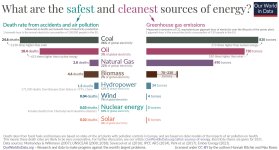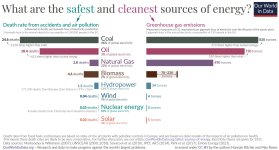Windscale, Three Mile Island, Chernobyl, Fukushima ... the list goes on.
Except that it doesn't, which is why your list only contains 4 entries.
Nuclear power generation is not safe or clean when the numerous accidents that have happened leave areas of the planet where humans can no longer live. This is to say nothing of the extremely toxic nuclear waste that is routinely generated and requires extremely expensive long-term storage, which is prone to failures. "Green" and nuclear should not be mentioned in the same sentence.
Nuclear fission is one of the safest ways to generate electricity, tied at the top with wind and solar. That's if you include Chernobyl. If you don't include Chernobyl, nuclear fission is the safest way to generate electricity by a significant margin. Since something like Chernobyl is impossible with a modern nuclear fission power station, that means that nuclear fission is currently the safest way to generate electricity.
Also, why are you referring to 2 as "numerous"? "numerous" means "a very large number" and 2 is not a very large number. You could get to 3 if you include nuclear weapons production facilities (Kyshtym), but those aren't power stations. And 3 still isn't anywhere near "numerous".
With existing technology, we have three choices:
1) Burning carbon-based fuel.
2) Nuclear fission.
3) Collapse of civilisation.
The collapse of civilisation could be argued to be "greener" than the other two, although it would be less "green" in the short term. But you're probably not advocating the collapse of civilisation and the death of almost all humans, maybe the extinction of humans. Nuclear fission is certainly "greener" than burning carbon-based fuels.
Anything else is based on ignorance, empty promises, grift or potential future technology that doesn't exist but might exist at some unknown point in the future. Renewables includes all four of those. Especially the claim that a 100% renewables supply is possible with existing technology. It isn't, simple as that. We can't control generation and we can't store anywhere near sufficient scale and we can't operate sufficiently large transnational grids. Not even for current electricity use. If we're to stop burning carbon-based fuels entirely, our electricity requirements will be ~6 times higher than they are now. We're nowhere near being able to meet current electricity requirements with 100% renewables, let alone 6 times as much. It's not a matter of building more windmills and solar panels. It's far more fundamental than that - it's that we can't control the weather.
Many people even believe the stated nameplate generating capacity figures for renewables because that's what they're told and they never do any checking. This wind farm generates 10GW! No, it doesn't. It generates a wildly fluctuating amount between zero and maybe as high as 7GW, averaging about 3GW. The nameplate capacity is for theoretical perfect weather conditions, which rarely if ever exist. But
the fundamental problem is the lack of control. You can't power a civilisation from that. 100% renewables is only possible in extremely rare conditions, with abundant land, the right geography and a very low population density. Norway is probably the only country that could do it due to hardly anyone living in most of it and an abundance of hydro and geothermal.
Nobody is advocating a 100% fission grid. What's being advocated is a mix of renewables and fission, a mix that makes it possible to keep the power on without burning carbon-based fuels. It's the only way to keep the power on without burning carbon-based fuels. Fission is also being advocated as a temporary measure, not a permanent one. We're hoping for that potential future technology (large enough storage, fusion, anything else that might exist at some point in the future). We're just not pretending it already exists. Because it doesn't.
Fusion has a basic problem: how do you start energy production without an external power source?
Almost every power station has that problem. It's not a significant problem unless the entire grid fails. Even then, there should be the capability to restart it in any grid designed even somewhat sensibly. In the UK, for example, there are multiple black start facilities. Dinorwig is the most famous one and it's capable of restarting the entire UK grid by itself. It's what it was built for.






